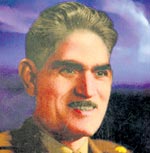
Republic Day message for imperialists and IraqisAs the United States Senate burned the midnight oil and debated Iraq this week, the people of Iraq remembered an important landmark that made them feel really independent. The historic event on July 14, 1958 and what led to it should send shivers down the spines of those who have invaded Iraq. Prime Minister Nouri al-Maliki described it as "a decisive step in the long march of the Iraqi people". Iraq received independence in 1932 from the British, who manipulated the League of Nations, the predecessor of the United Nations Organisation, and obtained the power of mandate to rule the country in 1920, just as the United States manipulated the US Security Council in 2003 to invade Iraq.
In fact, the plan to colonise Iraq was drawn up much earlier. Under the secret Sykes-Picot Agreement between France and Britain, Iraq and Palestine, among other territories in West Asia, were to come under the British while France took over Lebanon, Syria, and some North African states. Much of West Asia was under the rule of the Turkish Ottoman empire, which joined Germany in the First World War. The Turks lost the war not because of the military superiority of the allied forces, but because of the rebellion by their Arab legion and the betrayal by the Hashemite and Al-Saud clans who pledged loyalty to the British. It was Gertrude Bell, poet and West Asia expert at the British Foreign Office, who drew the frontiers of Iraq after the Turks withdrew. The British retained Kuwait, which was part of an Iraqi province under the Turks. Saddam Hussein in 1990 tried to take Kuwait back but his attempt backfired and subsequently paved the way for the US invasion of his country in March 2003. British colonizers foisted on Iraq a 'foreign' king - Emir Feisal who was the son of Sherif Hussein, the governor of Mecca during Turkish dominance. Hussein's other son, Abdullah, was planted as king of Trans Jordan. Feisal was Iraq's nominal king. The power behind the throne was Jafar Askari and later his brother-in-law Nouri al-Said, the much-despised figure in Iraq's history. The British told the Iraqis they had come not as conquerors but as liberators - the same crap the Iraqis were told by George Bush and Tony Blair in 2003. Emir Feisal came to a country where he commanded little respect of the populace. Before the Brits could implement their tried and time tested divide-and-rule policy, the Sunnis, the Shiites and the Kurds united for a cause. Secret societies such as Haras al-Istiqlal which stood for the ouster of the Brits and King Feisal attracted widespread popular support. The appeal of poet Muhammad al-Obeidi was heard throughout Iraq during their first independence struggle against the Brits in the 1920s. "Set fire noble Iraqis Today the waters of the Tigris carry scores of bodies down stream daily. There is no Poet al-Obeidi. No Sunni-Shiite-Kurds unity. The invaders have learnt a lesson from the past and saw to it that Iraqis remain divided. It was the unity of the people that forced the Brits to leave Iraq and grant them independence in 1932. But the imperialists came back on the eve of World War II when the Iraqi people began to assert their independence. The re-entry was made possible by traitors Britain had nurtured.
King Feisal was a British plant, but he soon realised he had little power and resigned to his fate. His son, Ghazi who ascended the throne in 1933 after Feisal’s death asserted himself and housed an anti-British rebel radio — Radio Al-Jazeera — inside the palace. He succeeded in ousting the pro-British government by instigating two military coups. The Brits were furious. They wanted to restore the status quo ante. King Ghazi was killed in a mysterious car crash. The Iraqis didn't believe that it was an accident. They accused Nuri al-Said of killing Ghazi in concert with Queen Aliyah, his estranged wife, and her brother Abdullah. For two decades, the Iraqis stolidly put up with pro-British puppets in power — the palace and the government. They waited for their date with destiny. And that day dawned on July 14, 1958. General Abdul Karim al-Qassim, son of Sunni-Shiite mixed parents, seized power in a military coup around 6 in the morning and declared Iraq a republic. Around 6.30 a.m., Col, Aref, Qassim's fellow officer, announced on Radio Baghdad that: "with the loyal aid of loyal sons of the people and the national armed forces, we have undertaken to liberate the beloved homeland from the corrupt crew that imperialism installed…" Young Army officers who went to the palace to negotiate the surrender of the royal family lost their control and gunned down the young king, Feisal II, his uncle Abdullah and other palace officials. Nouri al Said tried to escape disguising himself as a woman. He was spotted and executed. The imperialist puppets were denied any decent Muslim burial. The bodies of Abdullah and Nouri were cut to pieces and burnt. July 2008, when Iraqis will mark the 50th anniversary of this national event, they will surely hope to see another Abdul Karim al-Qassim and breathe the air of freedom. Bush has manacled them, after ousting Saddam Hussein. It is the United States that takes crucial decisions in Iraq, regarding military operations, regarding oil - just as much as the British foreign office took crucial decisions on behalf of the puppet government in Baghdad prior to the 1958 coup. The US embassy is playing the role the British High Commission was playing then. It's the same old imperial game, though the Bush administration gives it different names - liberation, democratization and war against terror. It's a shame that the people of the United States are being terrorized by the Bush administration which invokes the horrors of 9/11 to gain political mileage and advance its ulterior motives linked to Corporate America. Despite a 24-hour non-stop Senate debate, despite their majority, the Democrats failed on Wednesday to change the course of the Iraq war. It exemplifies the power of Corporate America. Where is the people power in America? Only a handful of Americans, like dejected anti-war activist Cindy Sheehan, are calling for the impeachment of Bush, although the Iraq war is very unpopular among Americans. Richard Nixon and Bill Clinton lied to the American people and were not spared the impeachment process. But the call for the impeachment of President Bush is not heeded with the seriousness it deserves. The lack of movement in the direction of impeachment could mean that the call for impeachment would gather pace in America only when it is an all-American affair. In Bush's case, it is an Iraqi affair. The American people felt that both Nixon and Clinton betrayed the trust vested in the office of the President. Is Bush being spared because he is seen to be pummeling their enemy - the Islamic terrorists? During the Cold War era, US capitalists would say that a good communist was a dead communist. And now during the war on terror, do a majority of Americans think that a good Muslim is a dead Muslim? Their indifference to hundreds of thousands of Iraqi deaths and the suffering of the Iraqi people make one believe that they think so. |
|| Front
Page | News | Editorial | Columns | Sports | Plus | Financial
Times | International | Mirror | TV
Times | Funday
Times || |
| |
Copyright
2007 Wijeya
Newspapers Ltd.Colombo. Sri Lanka. |

